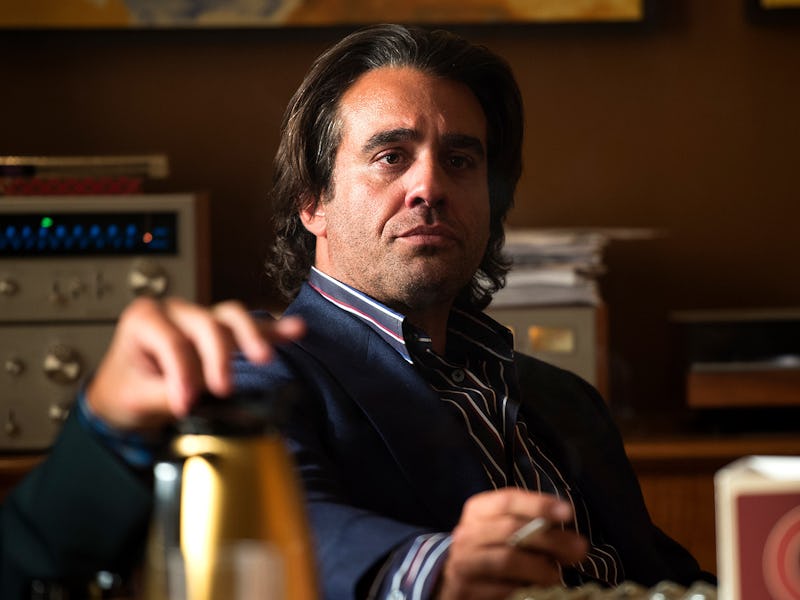The Nightmare of 'Vinyl' Deepens in Episode 6, Thanks to a Ghostly Cocaine Hallucination
The testosterone-fueled HBO series botches its dreamlike elements yet again.

Though we’re just six episodes into HBO’s new series Vinyl, its list of head-scratching moments is impressively long and varied. Though last week’s sexual and racial politics were embarrassing and short-sighted, this week’s “Cyclone” is arguably an even more painful watch, bookended by a Latino pool-cleaner listening to “Tequila” on a radio and a dreamlike Buddy Holly singing “Rave On” for precisely no dramatic reason. But nothing is as trying as this week’s integration of an omnipresent, hallucinated ghost character. Outside of horror film and television, this kind of move is almost impossible to execute well — even on smarter shows (see BBC/Netflix’s River. But on Vinyl, it’s a true disaster.
The spirit takes the form of Devon (Olivia Wilde) and Richie’s buddy from their days cavorting to the Velvet Underground — the German photographer Ernst (Carrington Vilmont). Hilariously, it’s meant to be the product of Richie’s (Bobby Cannavale) three-day bender in a darkened room in his Connecticut home, ripping lines and chugging straight from the bottle like the haunted white man he is. It’s easy to accept this scene as a dramatic device, but we learn later — when Richie tells Devon he’s been “hanging out with Ernst” — that Finestra truly believes this devil on his shoulder was real.
Ernst (Carrington Vilmont) revealing himself
The most trying element of Ernst’s inclusion here is that it becomes clear — generously — within episode’s first half that he is not a real person. He’s around many other characters alongside Richie and ignores them; he flits in and out of locations that don’t make sense for him to visit. Yet the moment of revelation is prolonged to the very end of this exhausting 66-minute episode, as if it’s some crazy twist no one could have seen coming: We’re shown a bleeding hole in the back of his head. The episode then lapses into a totally expendable flashback, showing Ernst’s death in a car crash with Richie at the wheel. We understand, in all its staggering corniness, why the ghost of Ernst has been blabbing on about wanting a Nathan’s hot dog so much increasingly throughout the episode.
The unsurprising revelation unlocks a number of obnoxious questions: Is Richie, in some way, clinically insane? Or was the coke in 1973 just that good? (Incidentally, why do the writers of Vinyl always lapse into treating cocaine like some odd combo between ecstasy and acid?) Are other things we’ve seen on the show going to be revealed to be fabrications? Most likely, this will be a one-time plot device; like the intermittent beyond-the-grave musical performance, these are baroque stylistic flourishes we’re not really meant to justify dramatically..
The demonic influence of Ernst is pretty hard to stomach — mostly, hearing his high-pitched, heavy accented voice softly encouraging Richie to molest every female he comes across, and keep giving him a “toot.” But the nebulous significance he’s ultimately meant to have in the plot is far worse. It’s just another way of making the nothing-but-awful Richie seem like a broken, troubled man with remorse that with whom we are, on some level, meant to sympathize.
“Richie’s a good man,” Devon’s girlfriend and Ernst’s ex Ingrid (Birgitte Hjort Sørensen) tells Devon in the Chelsea Hotel. It’s a comment without justification, and this is, essentially, the show’s view as well. One of its primary tasks is to somehow make us sympathize with a character who spends most of his on-screen time doing horrible things. There are daddy issues, among other things, behind this, yet Vinyl never even comes close to making us care about the whys and wherefores, or justifying its own boorish, macho excess. But we’e got a whole other season ahead of us, so rave on, HBO.